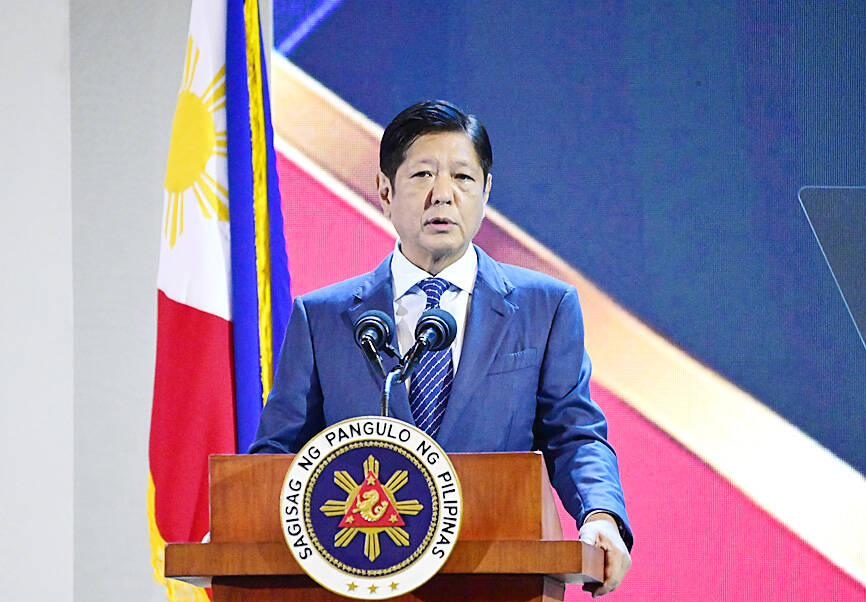Philippine President Ferdinand Marcos Jr has eased travel restrictions for Philippine government officials to Taiwan, with the goal of increasing opportunities for the development and expansion of the country’s priority areas of investments, the Philippine News Agency (PNA) reported yesterday.
The travel limitations were first imposed in 1989 during the administration of former Philippine president Corazon Aquino. The executive order had banned all Filipino government officials from making official visits to Taiwan, meeting with Taiwanese officials, or engaging in any official activity related to Taiwan without permission from the Philippine Department of Foreign Affairs (DFA).
Marcos on Tuesday last week signed Memorandum Circular, with the content being made public yesterday.

Photo: CNA
Under the new policy, travel restriction would only apply to the president, vice president, secretary of foreign affairs and secretary of national defense, the PNA said.
Philippine officials who are to visit Taiwan for economic, trade and investment purposes are required to use their “ordinary passports and without using their official titles,” the report said.
They must also inform and coordinate with the Manila Economic and Cultural Office (MECO) in Taipei, the Philippines’ de facto embassy in Taiwan, before their trip.
The new policy also allows Filipino officials to host Taiwanese delegations for economic discussions, but MECO should be notified at least five days before the meetings.
The memorandum further stipulates that no official documents can be signed with Taiwanese government agencies without prior approval from the DFA and the Office of the President, the report said.
In Taipei, Minister of Foreign Affairs Lin Chia-lung (林佳龍) affirmed the Philippine government’s efforts to enhance relations between Taiwan and the Philippines, adding that the new policy would deepen practical cooperation between the two countries under the framework of integrated diplomacy.
The Ministry of Foreign Affairs also said in a statement that Taiwan is the Philippines’ eighth-largest export market, ninth-largest trade partner and 10th-largest source of imports.
“As President Ferdinand Marcos Jr has said, the stability across the Taiwan Strait is the priority, and peace, safety and stability is the concern of all nations. Taiwan will continue work with the Philippines and other democratic allies and make contributions to the regional prosperity, peace and stability,” the ministry said.

MAKING WAVES: China’s maritime militia could become a nontraditional threat in war, clogging up shipping lanes to prevent US or Japanese intervention, a report said About 1,900 Chinese ships flying flags of convenience and fishing vessels that participated in China’s military exercises around Taiwan last month and in January have been listed for monitoring, Coast Guard Administration (CGA) Deputy Director-General Hsieh Ching-chin (謝慶欽) said yesterday. Following amendments to the Commercial Port Act (商港法) and the Law of Ships (船舶法) last month, the CGA can designate possible berthing areas or deny ports of call for vessels suspected of loitering around areas where undersea cables can be accessed, Oceans Affairs Council Minister Kuan Bi-ling (管碧玲) said. The list of suspected ships, originally 300, had risen to about 1,900 as

Japan’s strategic alliance with the US would collapse if Tokyo were to turn away from a conflict in Taiwan, Japanese Prime Minister Sanae Takaichi said yesterday, but distanced herself from previous comments that suggested a possible military response in such an event. Takaichi expressed her latest views on a nationally broadcast TV program late on Monday, where an opposition party leader criticized her for igniting tensions with China with the earlier remarks. Ties between Japan and China have sunk to the worst level in years after Takaichi said in November that a hypothetical Chinese attack on Taiwan could bring about a Japanese

The WHO ignored early COVID-19 warnings from Taiwan, US Deputy Secretary of Health and Human Services Jim O’Neill said on Friday, as part of justification for Washington withdrawing from the global health body. US Secretary of State Marco Rubio on Thursday said that the US was pulling out of the UN agency, as it failed to fulfill its responsibilities during the COVID-19 pandemic. The WHO “ignored early COVID warnings from Taiwan in 2019 by pretending Taiwan did not exist, O’Neill wrote on X on Friday, Taiwan time. “It ignored rigorous science and promoted lockdowns.” The US will “continue international coordination on infectious

DEEP-STRIKE CAPABILITY: The scenario simulated a PLA drill that turned into an assault on Taiwan’s critical infrastructure, with the launchers providing fire support Taiwan yesterday conducted this year’s first military exercises at Longsiang Base in Taichung, demonstrating the newly acquired High Mobility Artillery Rocket System’s (HIMARS) ability to provide fire support and deep-strike capabilities. The scenario simulated an attack on Penghu County, with HIMARS trucks immediately rolling into designated launch areas and firing barrages at the Wangan (望安) and Cimei (七美) islands, simulating the provision of fire support against invading forces. The HIMARS are supposed to “fire and leave,” which would significantly increase personnel and equipment survivability, a military official said. The drill simulated an exercise launched by the Chinese People’s Liberation Army (PLA) Eastern